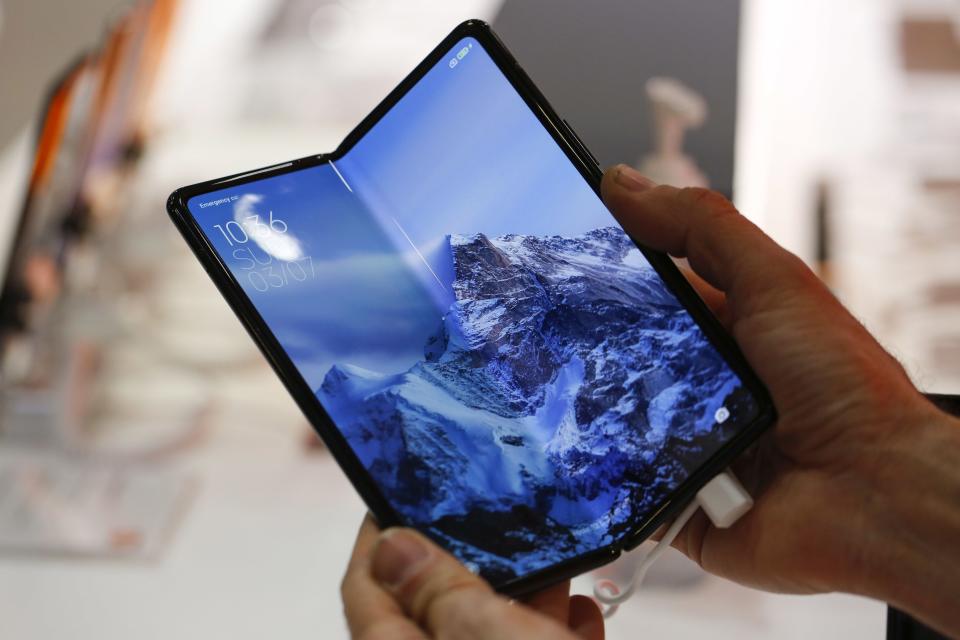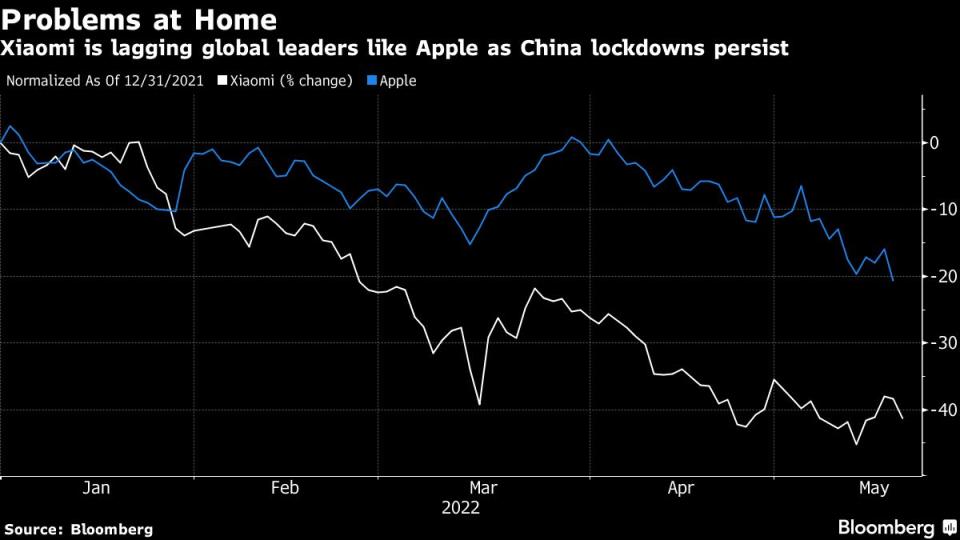Xiaomi Logs First Revenue Fall After Covid, War Hurt Demand
(Bloomberg) -- Xiaomi Corp. posted its first quarterly revenue decline on record after Beijing’s strict Covid containment policies and global component shortages crippled smartphone sales.
Most Read from Bloomberg
Social Media Stocks Sink to Erase $160 Billion on Snap Warning
Tech Drags Down US Stocks While Treasuries Climb: Markets Wrap
Stocks Climb in Risk-On Day While Bonds Decline: Markets Wrap
China’s largest smartphone maker is losing global market share to frontrunners Samsung Electronics Co. and Apple Inc. as consumer confidence wanes in a home market stricken by quarantines from Shanghai to Beijing. It logged sales of 73.4 billion yuan ($10.9 billion) in January-March, down 4.6% from the previous year, beating the average analysts’ estimate of 72.5 billion yuan.
Chinese smartphone vendors are under pressure at home as the country’s Covid lockdown measures hurt both retail demand and supply chains. The biggest chip factories in Shanghai have had to operate under strict restrictions on workers’ movements since late March following a lockdown of the financial hub.
Globally, dwindling consumer confidence due to inflation, geopolitical conflict and component shortages are depressing a once-vibrant mobile industry. But Xiaomi’s woes at home helped widen the gap with Samsung and Apple in the first quarter, when global shipments slumped 17.8%, according to research firm International Data Corp. Xiaomi’s local rivals Oppo and Vivo sustained steeper falls in the same period, data from IDC showed.
Xiaomi swung to a net loss of 587.6 million yuan in the quarter from a 7.8 billion yuan profit a year earlier, after accounting for fair value losses in investments.
“The Covid pandemic in China heavily impacted our operation and logistics. It also hurt consumers’ willingness to buy phones,” President Wang Xiang said in a call on Thursday. “The logistics issues also hurt our global shipments.”
Read more: Apple Suppliers, Top Chipmaker Succumb to China Lockdowns
The lockdown and war in Ukraine could shave about 200 million units off global smartphone shipments this year, with Chinese brands shouldering most of the lost volume, Semiconductor Manufacturing International Corp.’s Co-Chief Executive Officer Zhao Haijun warned last week.
“Pressures such as the supply shortage may start to ease in second quarter of 2022,” China International Capital Corp. analysts Hu Peng and Hanjing Wen wrote in a note to investors ahead of the earnings announcement. “The second half of 2022 is likely to be a peak season for the consumption of electronics products, boosting the firm’s results growth.”
To lower its dependence on smartphones, Xiaomi is trying to boost its sales of connected devices, such as $1,000 air conditioners and $40 door bells. The upcoming June 18 annual shopping festival, when online retailers compete to offer bargains, could revitalize mobile sales. Xiaomi has “strong momentum” in selling smart TVs, tablets, laptops, and connected home appliances, wrote China Construction Bank International Securities analysts Ronnie Ho and Clint Su. “The coming ‘6.18’ promotion event has the potential to support better smartphone sales.”
Still, Xiaomi faces strong headwinds in its efforts to keep its gross margin at the same level as a year ago, due to rising production and freight costs, Bloomberg Intelligence analysts Steven Tseng and Nathan Naidu wrote ahead of the earnings release. “Internet services, an important driver of long-term margin expansion, could also slow down as flagging handset demand may dampen the growth in monthly average users,” they said.
The downturn in the smartphone business, which makes up roughly 60% of Xiaomi’s sales, came after billionaire co-founder Lei Jun bet $10 billion to build an electric vehicle business from scratch -- a costly venture that requires talent recruitment, factory construction and investments in startups.
Growing challenges overseas are also a drag on Xiaomi’s business. Russia’s invasion in Ukraine muted retail sales in both countries. In India, the country’s anti-money laundering agency seized $726 million from a local unit of Xiaomi on a possible breach of foreign-exchange laws last month, exposing the Chinese brand to a legal risk in one of its biggest markets. Xiaomi has said its Indian operations are fully compliant with local laws.
(Updates with executives comments from the second paragraph)
Most Read from Bloomberg Businessweek
The Math Prodigy Whose Hack Upended DeFi Won’t Give Back His Millions
Compensation Is Becoming an Even Bigger Headache in the Remote-Work Era
The Most Important Force in Food Has Nothing to Do With Fake Meat
©2022 Bloomberg L.P.

 Yahoo Finance
Yahoo Finance 

